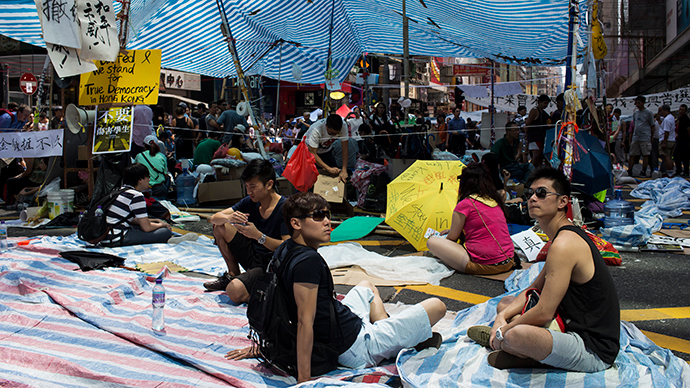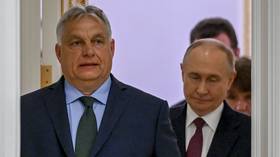'Another Tiananmen Square in Hong Kong - would be victory for US’

The US would love to break Hong Kong away from mainland China or to goad Beijing into overreacting to the demonstrations, and that is what it actively seeks to achieve through NGOs, Dr. Conn Hallinan, from Foreign Policy in Focus, told RT.
RT:The protests have continued unabated for almost a week now, with Friday marked by street clashes. Where do you see it going from here?
Conn Hallinan: The thing is that the demonstrations themselves certainly have their own legitimacy. Hong Kong is one of the most expensive places to live in the world. I think the minimum wage in Hong Kong is around $3.20 an hour. I think what you have is a kind of a layer of very wealthy on the top, and then a layer of the most of the people in Hong Kong that are legitimately stressed by the cost of living, the cost of education, etc. And of course most people want a say how they are governed, and the way that they are governed. My concern with some of the Hong Kong demonstrations is that this is a case in which the US is also very active through non-governmental organizations, specifically the National Endowment for Democracy (NED) and the US Agency for International Development, and other groups like Freedom House. Those organizations are less concerned with democracy than they are destabilization. Those same groups were very active in Ukraine, prior to the coup. In fact the US poured about $5 billion into Ukraine over the period of several years and led to the situation perfectly where legitimate concerns about corruption were turned into a coup d’état. My concern in the case of China is that there is tension between the US, and China, and Japan over the East and South China seas. And then these demonstrations started up. My concern is that legitimate demands may be manipulated in favor of things that don’t really have to do with democracy and economic well-being.
RT:Beijing has for years been concerned that the US is trying to foment a 'color revolution' in Hong Kong, with government-backed groups and civil society organizations providing funds and training to Hong Kong's democratic movement. Are these concerns real?
CH: I do think that concerns are real. And this is a difficult point. The difficult point is that there are absolutely legitimate reasons for the majority of people in Hong Kong to be concerned about their economic well-being and also on the question of democracy. Beijing has been heavy-handed in the way that they have dealt with demands for democracy. The problem that I have is that organizations like The National Endowment for Democracy don’t seem to be active in places that you would think they would be if they were concerned about democracy like Saudi Arabia or the United Arab Emirates, Kuwait or any of the Gulf monarchies. They are very active in the places like Venezuela, where they played an important role in the 2001 coup against Hugo Chavez, there are very active in Ukraine and the coup that led to the overthrow of the elected government. They seem to be concerned about democracy in those countries that the US is in competition with. And that is where the suspicion on the part of the Beijing authorities lies and they have legitimate concerns. The way to deal with that, however, is not to take the bait which is to say crushes the democracy movement. Instead, what it is for you to sit down and you to negotiate a political settlement. I think that most polls, for instance, in Hong Kong show that the majority of the Hong Kong residents want to negotiate this settlement, they don’t want a confrontation. They want more democracy, they want a better economic situation for themselves and those are legitimate things that really need to sit down with the Beijing government and negotiate on.

RT:The US says that Beijing should allow the highest possible degree of autonomy for the city. Why does Washington feel it can dictate the rules to a sovereign state?
CH: Keep in mind that when you are talking about Hong Kong, there was a treaty signed in 1997. And the treaty signed in 1997 was that for a period of 50 years that the Beijing government that is mainland China, The People’s Republic of China, would not interfere in any kind of major way in Hong Kong. To a certain extent that has held up, and to a certain extent it has not held up. But I do think that the US would dearly love at this point to either break Hong Kong away or to kind of goad the Beijing authorities into overreacting to the demonstrations. That would be if you have for an instance another “Tiananmen Square” in Hong Kong that would be a tremendous propaganda victory for the US. That is exactly what they have done in Ukraine. If you follow the way that Russians are currently have been portrayed in the American media you would think you were back to 1951, 1952 in the very heart of the Cold War. And that was done essentially by provoking a situation in Ukraine and then a coup. I think the US would love to do that. I think what is important here is that The People's Republic of China and the authorities in Beijing keep their head about this situation and not overreact. Any kind of effort to massively suppress these demonstrations is just going to make things worse. I think this is where you sit down and talk. This is what Moscow has been talking about since last summer in the relations to Ukraine, and those causes for talks and for the political resolution have been consistently rejected by the US, by the West.
RT:Protesters threatened to storm government buildings if Beijing doesn't give in to their demands. Events also unfolded this way in Kiev after the US expressed its support for Maidan protests. What does this pattern tell us? Do you think there are a lot of similarities?
CH: I do think that there are a lot of similarities, and that is my concern. And the reason why I keep going back to Ukraine is because the Hong Kong situation is developing. But we have seen what happened in Ukraine. I do think that many of the same forces are at work here in Hong Kong. And that is not to say that the Hong Kong government doesn't have to deal with some of the demands of demonstrators. For instance, the governor of Hong Kong is very unpopular. However, again the way that you remove elected officials is through elections, not coup d’états, not massive demonstrations in the street which essentially overrule democracy. You do this in the ordered way through elections. Is that going to happen in Hong Kong? I think that depends on what the reaction is in Beijing, and whether the central authorities in the People's Republic of China wisely choose a path that would not lead to confrontation, that eventually would be not just a national tragedy but an international tragedy.
READ MORE:‘Internal affair’: Beijing warns foreign countries not to meddle in Hong Kong

RT:The Chinese Foreign Minister stated that Beijing would not tolerate any interference with the ongoing protests saying it's the country's internal affairs. Will the US abide by these principles?
CH: It is the country’s internal affairs. Can you imagine, for instance, back in the year 2001 in the first election of George Bush if somehow China stepped in and tried to influence the outcome of the 2001 election and the uproar over the fact that the person who was elected as a president did not receive the majority of votes in the country. There would have been an international scandal. And the Chinese authorities are correct to say that it is an internal affair which doesn’t mean that it doesn’t have international implications. I think that Beijing authorities need to keep their eye on the international conditions that this is a part of.
RT:Russia and Hong Kong have boosted cooperation against the backdrop of EU and US sanctions over the crisis in the east of the nation. Could the US be targeting not only Russia's economy, buy its allies as well?
CH: The situation with the economy is that Hong Kong of course has the pretty strong economy at this point. And the mainland Chinese economy is strong by international standards, but slowing down by Chinese standards. I do think that the current crisis could have a real economic affect not only on Hong Kong but on mainland China as well - just as the Ukrainian crisis has an impact on the European Union’s economy, and on the Russian economy. So there are a lot of very potentially dangerous characteristics to this current event, and it is going to take patience and wisdom to get through without some really serious ramifications.
The statements, views and opinions expressed in this column are solely those of the author and do not necessarily represent those of RT.
The statements, views and opinions expressed in this column are solely those of the author and do not necessarily represent those of RT.












